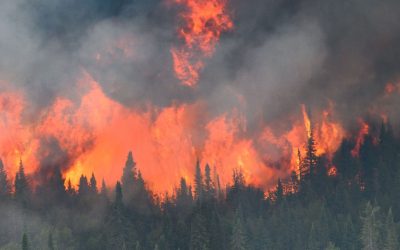It may be getting even tougher to pick a winter holiday destination. If media reports are to be believed, we could soon add Regina and Thunder Bay to our list of winter fun spots, given the 3.9 C rise in temperature above the ostensible long-term average estimated by Environment Canada. Even if true, perhaps still not quite enough to make you crack open that tube of Coppertone.
According to a recent story in The Globe and Mail, “Canada has experienced its warmest winter since modern record-keeping began.” The corner where Alberta, Saskatchewan and the N.W.T. meet experienced the greatest deviation. But before you buy a time-share in Uranium City or Fort Smith, it’s worth considering a few facts.
Alert and patient readers who read the entire Globe piece learned that Canada’s “modern record-keeping” began in 1948. In other words, the global warming zealots and their media acolytes are trying to compress geological time into little more than half a century.
Not to mention that virtually everywhere except Canada had some of the worst winter weather in news media paleo-terms, i.e., about 60 years. Despite the certainty of stirring Canadian schadenfreude, this went curiously under-reported here at home. Newspapers in Dubai and China were more interested in bizarre blizzards hitting places that are normally green in March.
If you were consigned to wintering in Minsk or Pinsk, things were pretty bad. In Poland, up to 175 cold-related deaths occurred just to the end of January. Temperatures plunged to -25 C in Warsaw and -35 C in southeast Poland, with Krakow suffering disruption of its hot water heating system. In Ukraine, 53 people died on a single cold day. The Baltic States also suffered, with as many as 150 Latvians hospitalized due to the cold. Riga felt a bone-chilling -29 C, the lowest temperature recorded since 1956. Moscow sank to -38 C, a figure not observed since 1978-79.
Massive snowfalls hit Japan — up to four metres in Niigata Prefecture northwest of Tokyo — and by mid-February the cold had claimed 118 lives. Central and southern Portugal saw snow for the first time in 50 years. Heavy snow forced the closure of the Acropolis on Jan. 25, while the Danube in northeast Bulgaria was 90% frozen over. New Delhi experienced frost for the first time in 70 years. An estimated 180 people succumbed to cold in India.
England and Wales were colder than average, while kilt-wafting breezes made Scotland warmer. Aberdeen had its second warmer-than-average winter in a row. Book your 2007 Robbie Burns day trip now!
With so much genuinely newsworthy aberrant weather occurring worldwide, why is Canada’s relatively placid winter major news? One should hardly be able to imagine headlines proclaiming, “Montrealers enjoy fifth sunny Canada Day in a row: temperatures 2.8 degrees above long-term average.”
Well, maybe we can, now that weather has been appropriated as a political tool for the climate debate. Despite the statistically tenuous and conceptually non-existent connection of specific weather events to overall climate trends, many commentators simply cannot resist playing the amateur climatologist. Warm weather blips are reported — there are always above-average temperatures somewhere — to bolster popular anxiety over global warming or, as it’s now termed, “climate change.”
The politicization of the climate change debate, whether by misanthropes seeing humanity in perpetual conflict with nature or neo-Luddites viewing technology and economic growth as intrinsically bad, drives the media bus. Once the mankind-bad, destroying-Earth paradigm is set, the facts will follow. Sometimes with comical results. One earnest Denver reporter a couple of years back stood outside a climatology conference meeting hall intoning the dangers of global warming — in the middle of a fierce June snowstorm.
Beyond that are zealots who spin any weather pattern as more proof that global warming is upon us. Some in the eco-blogosphere see both the warm Canadian weather and the Eurasian cold snap as evidence of human-induced climate change, even of the “extinction” of the Gulf Stream. This because a scientist had postulated that cold waters from melting Arctic ice could disrupt the North Atlantic ocean current. We’ll soon be living The Day After Tomorrow. Or maybe not.
It should go without saying, but it sadly doesn’t, that basing any conclusion on a few decades of weather data amounts to a parody of climatology, which depends on long-term, broad global behaviour over multiple millennia. Determining paleo-climate is of course a huge challenge in itself, open to all sorts of manipulation, as writers on this page have very ably demonstrated.
Some stubbornly cogent analysis of this winter’s weather came from the U.S. National Weather Service. “Winter follows natural cycles, and what people may interpret as extremes in weather patterns aren’t so unusual at all,” said meteorologist Dave Nicosia, showing disarming rationality. A colleague added that, “The European … [cold block] … was uncommon, but weather can be unpredictable and equally unexplainable.”
That almost makes too much sense. Prospective travellers should know one more thing. The U.K.’s Meteorological Office correctly predicted this year’s cold European winter. So before booking your next flight, you might want to check with them, rather than Canada’s credulous news media.
© National Post 2006


